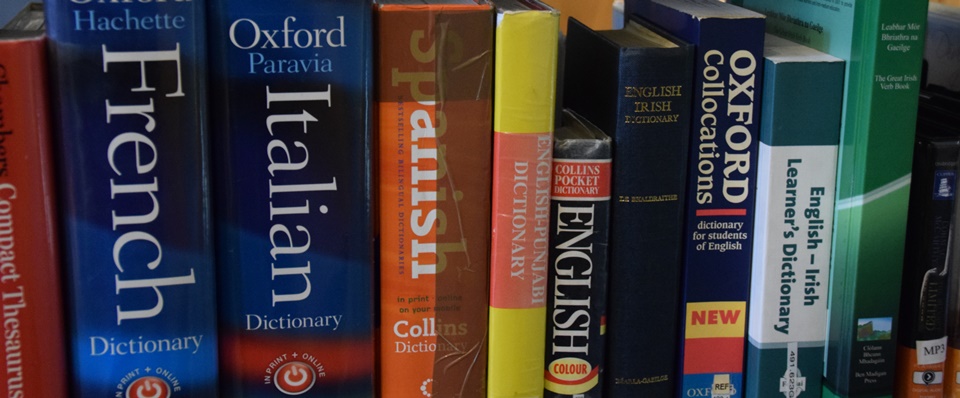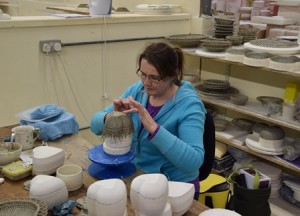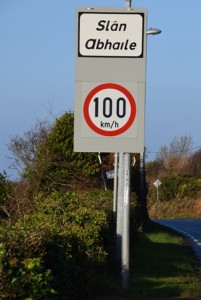25 Divided by a Common Language Redux
Posted by Christine on Dec 8, 2014 in Ireland | 2 comments
Here are some more language stories collected by an American surrounded by—and rapidly learning—Irish English. For the first installment of “Divided by a Common Language” see post number 17 under “Past Posts.”
The other day an Irish friend asked me if I was enjoying my “doss” year. Luckily she asked this in an email, because I had to do some research before answering her. In UK and Irish slang, “doss” actually means “sleep rough” as in “she’s dossing at a friend’s house after the concert,” etc. “Doss” can also be a noun: “Did he find a doss for the night?” Another definition online mentioned that the word can be extended to mean “a situation giving the opportunity for being extremely idle.” While I’m certain that the Professional Development Committee and the powers that be at Agnes Scott College do not think of sabbaticals as “doss” semesters or years, I am ready to own this description of my sabbatical. And yes, thank you very much, I am really enjoying my doss year!
In fact, I’m having a grand time in my doss year! I’m not sure why “grand” beats out “great” in Ireland, as the two words are very close in meaning and origin. This is one of those words that’s said so often, I can’t help but say it myself, though I frequently get tangled up at the “grrr…” part, not sure which way I’m heading. One interesting use of “grand” that is a bit outside the scope of “great” occurs when you say something along the lines of “I don’t want to trouble you,” or “Is it okay if I sit here?” or “Is there anything I can do to help?” and the response is “Ah, you’re grand!” That means that there’s no problem, whatever  you are doing is fine, you don’t need to do anything else. I find this very heartwarming, and it makes me very well-disposed to whomever I’m talking to. Ah, you’re grand!
you are doing is fine, you don’t need to do anything else. I find this very heartwarming, and it makes me very well-disposed to whomever I’m talking to. Ah, you’re grand!
Here’s a side note that will, perhaps, only be appreciated by my brothers Jeff, Todd, and Mike. Our mother Barbara had a language of her own that combined baby talk with arcane references to what she called “boarding school books,” other elements of the culture of the twenties through the forties, and her own family oddities. Someday I’ll have to put together the complete lexicon. For example, whenever she encountered a baby she would always coo “Awww, lamb’s lettuce!” even in the eighties when her grandchildren were starting to arrive. I used to think this was something she made up, but I’ve recently discovered that “lambs lettuce” is really a thing—Valerianella locusta, also known as corn salad or mâche—and we have it in salad almost every day.
Remember “slated” from last time, as in “The London critics slated that play,” with “slated” meaning “panned”? The companion word is, apparently, “rated,” a shortened form of “highly rated” used to mean “praised”: “The London critics slated that play, but the Dublin critics rated it.”
Many if not most Irish people say “em” (short e as in “Auntie Em”) instead of “um” to fill the gaps between words and sentences. These verbal fillers or, derogatorily, “clutter words” are common in many languages and differ not only from language to language but from dialect to dialect, and sometimes from person to person. Long ago in History of the English Language at Stanford I remember learning that the “m” sound is the easiest to say and appears in most languages. Note how many languages have a word for “mother” that begins with “m.” So “um” and “em” are different vowel approaches to that common sound. But why do we have different vowels in different Englishes?
I am learning a lot about Ireland, language, and many other subjects from the ladies in the exercise classes at the gym I attend. The other day I was telling some of them about the epic Atlanta thunderstorms, and one of them said “There’s a word in Irish that translates as ‘repentance thunder.’” I knew exactly what she meant—that sky- and peace of mind-shattering clap that shakes you to your core. Respect for the heavens goes deep in Irish culture; the Irish word for “thunder” is thoirní, which also means “sudden repentance.”
The weather in Ireland is just not as bad as people here like to portray it, and I’ve been saying that since I first started coming regularly in 1986. Even when the sun is shining brightly and we haven’t seen rain for days, some people will barely admit that the weather is “decent,” let alone “good.” When you walk into a shop and greet a clerk or when you see someone you know on the street, a very common phrase—and one I had to listen closely to grasp because I was so surprised to hear it on a gorgeous sunny day—is “It isn’t very bad out there, is it?” or “Not at all bad out there, is it?” or the like. I suppose it’s a way of keeping expectations low. Apparently the very best weather—warm, sunny, not a cloud in the sky—is just a hair above “very bad” and must be defined on the “bad” scale rather than on the “good” scale. From what I’ve observed, I don’t think there is a “good” scale for weather here.
I talked last time about some ways in which the structures and practices of the Irish language influence the way Irish people speak English. Another such influence is the way a syllable is added to a word without any spelling support. Americans often wonder why many Irish people say “FILL-um” for “film” or “KILL-un” for “kiln.” The name “Charles,” which we pronounce as one syllable becomes “CHAR-less” here. The practice of adding a syllable is common in the complex pronunciation tendencies of Irish. The seemingly one-syllable word for stomach is boilg but is pronounced “BOWL-egg”; tolg, the word for sofa, is pronounced “TOLL-egg.” So the ways of one language determine how the other is pronounced.
Similarly, there is no real “th” sound in Irish, neither the hard “th” as in “then” nor the soft “th” as in “thick”),and some Irish accents carry this over to English, rendering “thirty-three and a third” as “turdy -tree and a turd.” You have the great Dave Yeates to thank for that one. As Dave would say, “Won’t you sleep better tonight knowing dat?”
To sum up both of the previous examples in one new example, how would you guess the town name of Thurles is pronounced? We were trying to go there once for a horserace and asked several people to direct us, pronouncing Thurles with a soft “th” and as one syllable rhyming with “girls.” All we got was blank looks. Finally, someone realized we were talking about “TER-less” and told us which road to take.
If someone calls you a “souper” in Ireland, it doesn’t mean you are “super.” In fact, being called a “souper” is a very bad thing. During the Great Famine—An Gorta Mór—of 1845-52, some protestant do-gooding groups offered watery soup to the starving people, most of whom were Catholics, if they would change their religion and give up speaking the Irish language in favor of English. After all, no one wants to subjugate a population that has a secret language—just ask the Americanslaveowners. Anyone who “took the soup,” no matter how close to dying of starvation or desperate to take care of family members, was henceforth regarded by their own people as a betrayer, a race traitor. “Souper” crops up occasionally today, sometimes said in fun—“Anyone who does what the teacher says to do is a souper!”—but sometimes said with more serious intent.
There are remarkably few words of Gaelic origin in English—which is a veritable sponge of a language, picking up and absorbing words from languages all over the world. This is surprising given how closely associated in space and time the two languages have been. One theory is that the contentious nature of the relationship over centuries prevented such borrowings. More recently, linguists have proposed that Gaelic is probably the source of great deal of English slang, especially American English slang. It makes sense that the language of Irish immigrants in the nineteenth century would infiltrate English via the casual words of everyday conversation. Here are a few examples I’ve come across lately.
- “Do you want to bug out of this boring meeting?” From bog amach, or “move out” in Irish. This one merges the Irish and the English, a fairly common occurrence in word formation. I’ve always used this phrase but never knew its origins.
- “So long, see you next month!” From slán, meaning “safe,” still the usual farewell in Irish as in “Slán” meaning “Be safe!” or “Slán abhaile” meaning “Get home safely!” (literally “safe to home”).
- “I saw a smashing film last night!” From is maith sin or ‘s maith sin, which is pronounced SMAW-shin and is a very common idiom meaning “that’s good,” literally “is good that.” I love this explanation and I hope it’s true, but word origins are often speculative at best.
In Ireland and the UK, nine times out of ten when someone bumps into you on a bus or in a shop (“shop” is more common than “store” here), he or she will say “Sorry!” instead of “Excuse me!” which is far more common in the US. Though I don’t try to pick up Irishisms, somehow I picked this one up long ago when I lived in the UK for four months, and I’ve been saying it ever since. I don’t really like this word in these circumstances: it sounds a bit abject, and the bumping is often as much the other person’s fault as mine. On the other hand, saying “excuse me” in a neutral and non-harrumphing tone can be very difficult. “Sorry” is shorter and easier to bring off. For a magnificent, heart-rending riff on the meaning of “sorry” in cross-cultural context, see Brian Friel’s dramatic masterpiece Translations. In that play, “sorry” becomes a medium for human connection that transcends the rigid strictures of colonialism, expressing respect, acceptance, and love across cultures, languages, and time.







I believe you have a new picture for the ASC website faculty directory.
It would be an improvement, believe me.